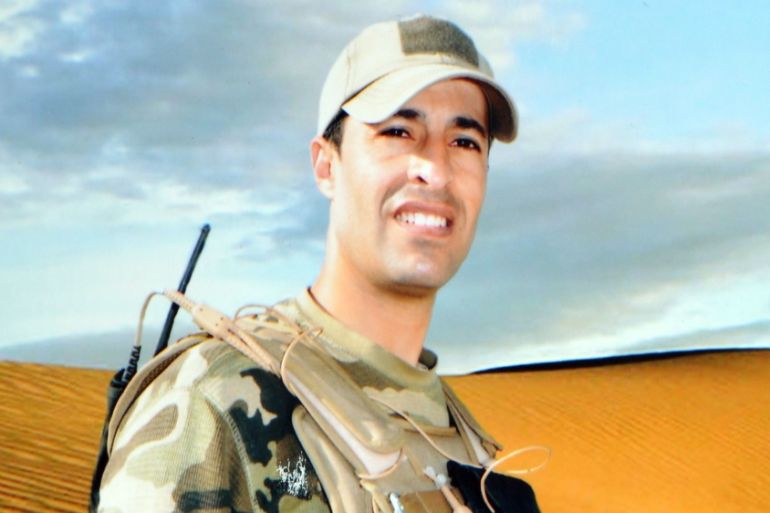Remembering Moneem Gharsalli: ‘He died for Tunisia’
Moneem Gharsalli, a captain in the Tunisian National Guard, was killed by ISIL-affiliated fighters in June.

Kasserine, Tunisia – Moneem Gharsalli looked exactly like his mother. His angular nose sloped downwards towards lips that stretched widely across his face.
His 61-year-old mother, Jamila, greets me warmly. We are in Moneem’s childhood home in the western Tunisian city of Kasserine and the young man’s eyes stare out from the photographs that plaster the living room walls.

But Moneem is not here.
Keep reading
list of 4 itemsMoscow theatre attack suspects show signs of beating in court
Four men showing signs of severe beating charged over Moscow concert attack
Russia mourns Moscow concert hall attack victims as death toll rises to 137
He was killed four months ago in an attack 70km away, and Jamila is left with a pain so unbearable that no words can describe her loss.
“He was my first boy. He was the dearest because he was the first … I still can’t believe he’s gone,” she says, her eyes wet, her hands tightly clasped. She uses the ends of her canary yellow headscarf to wipe away her tears.
Early on the morning of June 15, Moneem, 32, a captain in the Tunisian National Guard who worked with the anti-terrorism brigade and then with the rapid intervention brigade, was at home, having just returned from a shift working as a security detail at a concert.
The phone rang. It was his superiors in Tunis alerting him to an attack in Sidi Bouzid. Could he respond straight away, they asked him.
“He was always the first to respond in these situations,” says his younger brother, Najed, 30.
Following in his father’s footsteps, Moneem had, since 2006, been working with the national guard. He had participated in advanced crisis management and security training provided through the US state department.
So, Moneem gathered his protective gear and weapons and jumped into a military vehicle with a driver. He had worked in dangerous situations before.
The job was a natural fit for Moneem. He was smart and calm under pressure, but with an authoritative air. “No one dared to fight him or insult him,” childhood friend Ayman Aloui, 32, recalls.
He remained the same serious, steady person as he grew older. “He was someone good. Everyone in the community knew him,” says Rabii Gharsalli, a resident of Kasserine.
RELATED VIDEO : One Minute ISIL
On that June night, as Moneem stepped out of the car, wearing a helmet and holding a Kalashnikov, he was confronted by seven armed fighters.
In a moment of panic, his driver drove away.
There was supposed to be back-up just 3km away, but it never came.
For the next several minutes, Moneem single-handedly engaged in a shoot-out with the fighters, during which, according to the national guard, he sustained a shot to the knee.
A continuing struggle
Since the 2011 revolution, more than 7,000 Tunisians have left the country to fight with the Islamic State of Iraq and the Levant (ISIL) in Iraq, Libya, and Syria. The country has suffered two high-profile attacks, one at the Bardo Museum in March and a second at the Sousse beach resort in June, orchestrated by ISIL-affiliated fighters allegedly trained in Libya.
While those two attacks almost exclusively killed foreign tourists – one police officer was killed in the Bardo Museum attacks – Tunisians have borne the brunt of ISIL-linked attacks in their country since 2012. Last month, a 16-year-old shepherd was beheaded by ISIL fighters. His severed head was sent in a bag to his family.
Those working in the country’s security apparatus are particularly vulnerable. Soldiers guarding checkpoints have been routinely attacked – 14 were killed in one incident in July 2014. On November 17, Tunisian security dismantled a 17-member sleeper cell that was allegedly planning to attack hotels and police stations.
Only a few days later on, November 24, an ISIL-affiliated suicide bomber detonated his bomb on a bus carrying security personnel in Tunis. Twelve members of the presidential guard were killed.
‘He died for Tunisia’
Like others in the country, Moneem’s family is left with only loss.
“We were always scared for him,” Jamila says, her voice catching. Her grief is deep.
Najed brings out photo albums and diplomas, and together, mother and son thumb through certificates from Moneem’s life and death, as well as the six-inch thick binders stuffed with his training material.
Their pride in the documents and the person they represent is palpable. Moneem’s status in the national guard, the way he took on family responsibilities after his father’s death in 2010, his marriage just a few months before he died, his hopes to start a family of his own all fill their memories now.
But there is also anger and many unanswered questions.
On the night of his death, the family says, Moneem was left on the ground to bleed for two hours before his lifeless body was retrieved. It is impossible to know if he would have survived had he been taken to hospital earlier – for no autopsy was ever performed. No photographs were taken of his body either.
When Najed went to Sidi Bouzid to get answers about his brother’s death, he was brushed off and told to contact the authorities in Tunis.
After Moneem’s burial in a cemetery near Kasserine, the government compensated the family with $3,917 and 20kg of spaghetti.
“He died for Tunisia,” his family says. In return, they received a sack of processed wheat.
“The last time I saw Moneem was two months before he was assassinated,” says Ayman, his friend. “I asked him if Tunisia was in danger, and he assured me that he was going to fight this germ of terrorism until the end of his life.”
He pauses. “And that’s exactly what he did.”